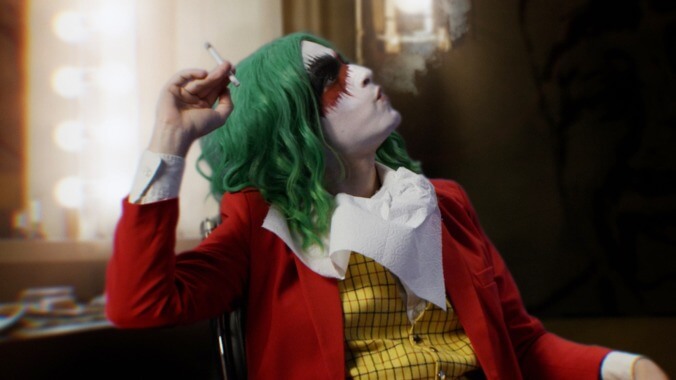The People’s Joker review: Transgender comic-book parody highlights the value of outsider art
Vera Drew’s pseudo-autobiographical riff on the Batman mythos has more to say than you might think
Film Reviews Joker
In an entertainment landscape dominated by intellectual property franchising made at increasingly higher budgets, it can sometimes feel like fresh storytelling ideas are considered too risky to be properly told, that only those films with majority mass-market appeal ever have a shot of finding their audience. Of course, for those who pay attention to the periphery, there is always an artist working at the fringes to provide a fresh perspective, a spirit that writer-director Vera Drew and her collaborators exemplify wholeheartedly in their DC Comics parody The People’s Joker.
Bursting with DIY creativity, a casual observer might think this is simply a fan project spearheaded by a marginalized creator. However, Drew, with co-writer Bri LeRose, uses the rough outline of 2019’s Joker as a springboard to explore her own experiences with the calcified halls of the comedy industry, the ways damaged individuals harm one another out of shame and ignorance, and her struggles with discovering her transgender identity.
Retrospectively narrating her story from humble rural beginnings as a child in Smallville, Joker the Harlequin (Vera Drew) guides us through a young adulthood where her mother (Lynn Downey) puts her on a regimen of the antidepressant drug Smylex, and comedy stardom is a path to escape on the stage of UCB Live, an unsubtle send-up of the Upright Citizens Brigade, SNL, and its showrunner Lorne Michaels (represented as a flailing animated facsimile voiced by Maria Bamford).
However, upon arriving in Gotham City to find the avenues for success locked behind a paywall, the young and broke Joker—whose birth name is consistently bleeped out until her eventual transition—conspires with The Penguin (Nathan Faustyn) to open an anti-comedy club to circumvent the city’s Batman-enforced ban on independent comedy. It’s there that she meets Mr. J (Kane Distler), a transgender man who opens her mind to the possibilities of embracing her true sexuality and gender.
Shot entirely on green screen, The People’s Joker bears a proudly artificial aesthetic that balks at conventional notions of consistency. Characters animated in 3D and stop-motion or as puppets interact with the human cast, sometimes with deliberate care in their construction, other times with an equally deliberate post-punk carelessness. Some scenes are just entirely animated in 2D, not only for high action but for deeply intimate moments, signaling this creative choice is not meant solely to cut budgetary corners.
Overall, it’s a chaotic aesthetic that comes across as coherent because it is so chaotic. On one level, it directly lampoons the artificial mechanisms by which big-budget blockbusters tell their stories, yet it also provides an avenue for deeply personal storytelling within the framework of our shared cultural mythology.
Drew’s disdain for the mainstream New York comedy scene is apparent from the basic construction of her story, which examines how institutional comedy has functioned as a mechanism for oppression, keeping toxic and privileged individuals at the top of the entertainment industry under the faux impression that they speak truth to power. But against that backdrop of social commentary, Drew crafts a very human narrative that explores abusive familial relationships, both biological and found. She doesn’t give in to the temptation to treat the abusers solely as monstrous villains, however. Instead, there’s a pointed emphasis that people do not function simply like comic-book archetypes, and that heroism and villainy are relative and in flux depending on how we choose to show up on any given day.
This is, of course, exemplified through Drew’s transgender experiences, which will ring familiar to many transgender folks who transitioned as adults, particularly among the millennial generation. It’s refreshing to see a transgender woman tell her own story of self-discovery with such creativity, which is sadly noteworthy in the history of trans-centric media, but there is little to be said about it substantively beyond gesturing to its authenticity. Vera Drew is clearly a proud trans woman who, like many, took a difficult and circuitous route to find herself, and it’s not hard to see how a world so hostile to trans identity might push someone to become a Joker.
Given its intensely personal nature, any faults in The People’s Joker are nearly indistinguishable from its appeal. Occasional trips into Lynchian abstraction can feel excessive but are also totally in keeping with the manic energy driving the machine. That same manic energy can either energize a scene or cause jokes to fall flat, and it can be unclear whether falling flat was the point or if the anti- is overbearing the comedy. Foundationally, The People’s Joker is a chimera built of conflicts and contradictions, but so are we all. Our jigsaw assemblage of human experiences is universally messy, and if there’s one thing Drew seems to be telling us, it’s that we should be relishing those paradoxes. Then we won’t have to paint on smiles anymore. We can just be happy.
The People’s Joker opens in theaters on April 5, 2024